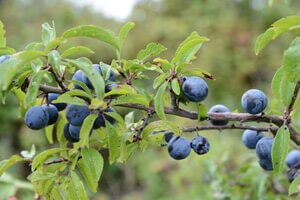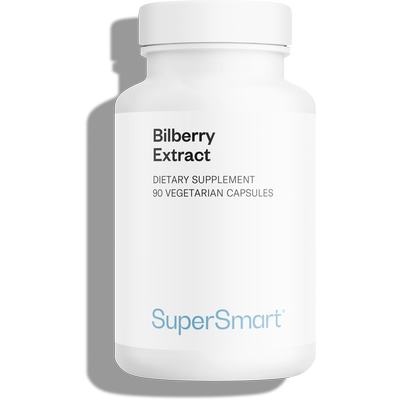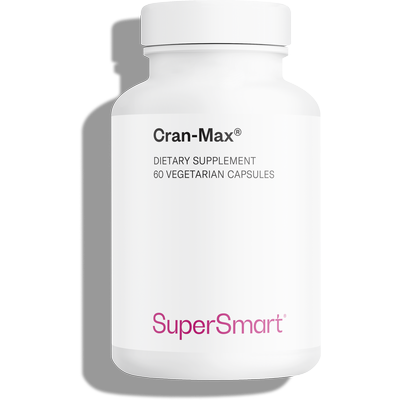03-07-2017
Berries, with supercharged antioxidant power
 Optiberry® is a nutritional supplement with scientifically-supported antioxidant potency and anti-cancer and anti-angiogenic properties. It contains extracts of six berries - wild blueberry, strawberry, cranberry, bilberry, elderberry and raspberry – all of which are rich in anthocyanins, powerful antioxidant pigments from the flavonoid family.
Optiberry® is a nutritional supplement with scientifically-supported antioxidant potency and anti-cancer and anti-angiogenic properties. It contains extracts of six berries - wild blueberry, strawberry, cranberry, bilberry, elderberry and raspberry – all of which are rich in anthocyanins, powerful antioxidant pigments from the flavonoid family.
Anthocyanins are plentiful in vegetables and fruits, especially berries, where they provide pigmentation and natural protection from oxidation. A growing body of evidence suggests that anthocyanin-rich berries offer numerous health-protective benefits, in particular, antioxidant and anti-angiogenic effects. Anthocyanins also help maintain DNA integrity, act as anti-inflammatory and anti-mutagenic agents and protect cardiovascular health by maintaining vascular permeability.
Anthocyanins differ from other natural flavonoids in the variety of colours that can be obtained from them. They also have powerful antioxidant properties. In one study, researchers found them to have the greatest antioxidant capacity of the 150 flavonoids they examined, placing them above oligomeric proanthocyanidins (OPCs) in antioxidant potency.
Experimental evidence indicates that some anthocyanins have anti-inflammatory properties; reports suggest oral anthocyanin administration may be useful in treating diabetes and ulcers and may offer anti-viral and anti-bacterial effects.
Powerful antioxidants
The health benefits of berry extracts are attributed primarily to their antioxidant properties. These can be evaluated using various measures such as oxygen radical absorbance capacity (ORAC).One study examined the antioxidant efficacy and absence of cytotoxicity of 20 different blends of blueberry, elderberry, cranberry, raspberry and strawberry. Optiberry® was found to have the highest antioxidant activity as measured by ORAC – its efficacy was greater than that of all the other combinations tested1.
In order to evaluate this supplement’s antioxidant properties in vivo, oxidation was induced in vitamin E-deficient animals using a hyperbaric oxygen exposure system. When Optiberry® was given for eight weeks before such exposure, it appeared to protect the animals’ lung and liver glutathione levels. In addition, compared with untreated animals, those that received Optiberry® for two weeks prior to exposure were protected from oxidation2.
Anti-carcinogenic and anti-angiogenic activity
Epidemiological studies confirm that people with a high intake of polyphenol-rich food and drink have a lower risk of cancer. Berries can act individually or synergistically to prevent carcinogenesis.Six individual berry extracts plus a blend of these six extracts were studied for their antioxidant and antiangiogenic properties. The six individual samples were found to inhibit expression of vascular endothelial growth factor, a marker of angiogenesis, though the Optiberry® blend of these six extracts demonstrated the greatest efficacy.3.
Researchers from Ohio State University in Columbus observed in vivo that wild or Canadian blueberry and the berry blend (Optiberry®) prevented angiogenesis by inhibiting infiltration of macrophages in haemangioma 4. (Infiltration of macrophages stimulates angiogenesis and promotes metastasis.) In mice treated with Optiberry®, endothelial cells exhibited reduced capacity for haemangioma formation, and tumour growth was halved compared with animals receiving non-treated cells 5.
Compounds in cranberry have been shown to inhibit carcinogenesis in breast 6 and prostate cancer cell lines 7. In addition, extracts of blueberry and chokeberry have been shown in vitro to prevent colon cancer8 while those of strawberry and blueberry inhibited mutagenesis in breast and cervical cancer cell lines 9.
Anti-bacterial activity
Berries have demonstrated capacity for targeting infections. Cranberry has been shown to reduce the strength of Helicobacter pylori infection and inhibit adhesion of the ‘flu virus. In an in vitro study, cranberry was also found to affect strains of the Listeria bacteria, while raspberry and blackberry had an inhibitory effect on gram-positive and gram-negative bacteria.A number of individual berry extracts – raspberry, strawberry, cranberry, elderberry, blueberry and bilberry - and extract blends have been shown to significantly inhibit growth of Helicobacter pylori, with and without the antibiotic clarithromycin. Conventional treatment for this infection centres on combining certain antibiotics and antacids. One of the main reasons that such treatments fail is growing resistance to antibiotics such as clarithromycin.
In this study, diluted suspensions of cells from Helicobacter pylori cultures were incubated with various concentrations of strawberry, raspberry, cranberry, elderberry, blueberry and bilberry, and with the Optiberry® blend. Diluted samples of each of these mixtures were grown again and the number of Helicobacter pylori colonies counted. Serially diluted cell suspensions with berry extracts were also exposed to clarithromycin, then grown in culture. When researchers counted the Helicobacter pylori colonies, they found all the extracts had significantly inhibited H. pylori, compared with controls. The extracts had also increased the bacteria’s susceptibility to clarithromycin, with Optiberry® demonstrating the greatest effect at the lowest concentration tested 10.
Protection for blood vessels
Anthocyanins protect small and large blood vessels from oxidative damage via a range of effects, including preventing the harmful consequences of elevated blood sugar in microvessels which are responsible for the complications of diabetes.In the course of inflammation, enzymes damage connective tissue in capillaries, causing blood to leak into surrounding tissues. Oxidants are released, also damaging blood vessel walls. Anthocyanins protect in a number of ways. Firstly, they neutralise the enzymes that destroy connective tissue. Their antioxidant capacity then prevents oxidants from damaging proteins in the blood vessel walls. Animal experiments have shown that supplementing with anthocyanins prevents inflammation and consequent damage to blood vessel walls 11.
Combatting atherosclerosis
The oxidant-scavenging capacity of anthocyanins makes them powerful weapons against atherosclerosis. First and foremost, they prevent a key stage in atherogenesis, that of LDL-oxidation. In vitro studies showed bilberry extracts to be effective at protecting LDLs from oxidation, even at very low concentrations. American researchers found bilberry extract to be a more powerful antioxidant than vitamin C. In a study of women with intrauterine growth retardation (which manifests as poor foetal growth), anthocyanin supplementation reduced levels of oxidised LDL from 1.04 mU/ml to 726 mU/ml after two months, while levels were unchanged in the control group.Secondly, anthocyanins protect the integrity of endothelial cells lining blood vessel walls. A study at Tufts University in Boston noted that elderberry anthocyanins were rapidly integrated into endothelial cell membranes where they prevented oxidation.
In addition, anthocyanins relax blood vessels. French scientists treated animal aortas with norepinephrine which makes blood vessels contract. The presence of the anthocyanidin delphinidin produced an 89% relaxation in the aortas, while a different anthocyanidin had no such effect.
The anti-inflammatory capacity of anthocyanins has been shown to help reduce allergic reactions. In one animal study, researchers in Bulgaria administered histamine and serotonin which cause allergic reactions and increase the capillary action of blood vessels. When the animals were given various flavonoid supplements, anthocyanins were found to exhibit the greatest anti-inflammatory effect of all the flavonoids tested.
Preventing some of the complications of diabetes
Damage caused by elevated blood sugar levels in microvessels is responsible for most of the complications of diabetes. Collagen proteins become bound to sugars resulting in abnormalities in blood vessel collagen. In a German study, 12 adult diabetics were given 600mg/day of anthocyanins for two months. At the end of the study, there was a significant decrease in abnormal collagen production 12.One of diabetes’ most serious complications is retinopathy which can lead to complete blindness. It occurs when the body tries to repair damaged, porous capillaries which it does by overproducing abnormal proteins. Anthocyanins counteract capillary porosity while preventing the proliferation of abnormal proteins. In an Italian study, 30 out of 40 subjects with retinopathy showed significant improvements after several weeks’ supplementation with 120mg/day of anthocyanins. No such improvement was observed in controls13.
Protection for the brain
Much attention has focused on cranberries for their apparent preventive effect against cerebral decline and stroke-induced damage, and protective effect against brain damage in the hippocampus 14. Scientists at Tufts University found that giving cranberries to elderly rats stimulated their memory function, restoring it to that of young animals. Markers of oxidative stress also decreased.1. Yasmin T. et al., Antioxidant capacity and safety of various anthocyanin berry extract formulations, Research Communications in Pharmacology & Toxicology, 8: IV, 25-33, 2003.
2. Bagchi M. et al., Safety and efficacy of a novel anthocyanin-rich multiple berry extract in vivo models, Annual Meeting of the Society of Toxicology, vol 4, March 2005, N S-1, Abs. 1393.
3. Roy S. et al., Antiangiogenic property of edible berries, Free Radical Research, 2002, 36: 1023-1031.
4. Atalay M. et al., Anti-angiogenic property of edible berry in a model of hemangioma, FEBS Lett., 2003, 544, 1-3: 252-7.
5. Bagchi D. et al., Anti-angiogenic, antioxidant and anticarcinogenic properties of a novel anthocyanin-rich berry extract formula, Biochemistry (oscow), 2004, 69: 75-80.
6. Ferguson P.J. et al., A flavonoid fraction from cranberry extract inhibits proliferation of human tumor cell lines, J. Nutr., 2004, 134, 6: 1529-35.
7. Seeram N.P. et al., Total cranberry extract versus its phytochemical constituents: antiproliferative and synergistiv effects against human tumor cell lines, J. Agri. Food Chem., 2004, 52, 9;2512-7.
8. Zhao C. et al., Effects of commercial anthocyanin-rich extract on colonic cancer and nontumorigenic cell growth, J. Agric. Food Chem., 2004, 52, 20: 6122-8.
9. Wedge D.E. et al., Anticarcinogenic activity of strawberry, blueberry and raspberry extracts to breast and cervical cancer cells, J. Med. Food, 2001, 4, 1:49-51.
10. Chatterjee A. et al., Inhibition of Helicobacter pylori in vitro by various berry extracts, with enhanced susceptibility to clarithromycin, Mol. Cell. Biochem., 2004, 265, 1-2: 19-26.
11. Bertuglia S. et al., Effect of vaccinium myrtillus anthocyanosides on ischemia reperfusion injury in hamster cheek pouch microcirculation, Pharmacol. Res., 1995, 31(3/4): 183-7.
12. Boniface R., Effect of anthocyanins on human connective tissue metabolism in the human, Klin. Montsble Augenheilkd, 1996 Dec, 209(6): 368-77.
13. Perossini M., Diabetic and hypertensive retinopathy therapy with vaccinium myrtillus antocyanosides, Metabolism, 2000 Jul, 49(7): 880-5.
14. De Revera et al., The effect of antioxidants in the senescent auditory cortex, Neurobiol. Aging, June 9, 2005. Wang Y. et al., Dietary supplementation with blueberry, spinach or spirulina reduces ischemic brain damage, Exp. Neurol., 2005, 193, 1:75-84. Galli R.L. et al., Blueberry supplemented diet reverse decline in hippocampal HSP70 neuroprotection, Neurobiol. Aging, April 30, 2005.
Order the nutrients mentioned in this article

A bilberry extract for improving microcirculation and reducing visual fatigue
www.supersmart.com
A high-quality cranberry extract for maintaining a healthy urinary tract
www.supersmart.comFurther reading
04-09-2019
A study published in Hypertension , the journal of the American Heart Association, has provided new evidence of this dietary supplement’s effectiveness for reducing the...
Read more13-02-2017
If you’re wondering about the benefits of zinc or how effective it is, a study published in The American Journal of Clinical Nutrition in 2016...
Read more16-11-2016
Astaxanthin is part of the large family of carotenoids endowed with powerful antioxidant properties. Astaxanthin is produced by several types of algae and plankton; it...
Read more© 1997-2026 Fondation pour le Libre Choix
All rights reserved
All rights reserved
Free
Thank you for visiting our site. Before you go
REGISTER WITHClub SuperSmart
And take advantage
of exclusive benefits:
of exclusive benefits:
- Free: our weekly science-based newsletter "Nutranews"
- Special offers for club members only

















